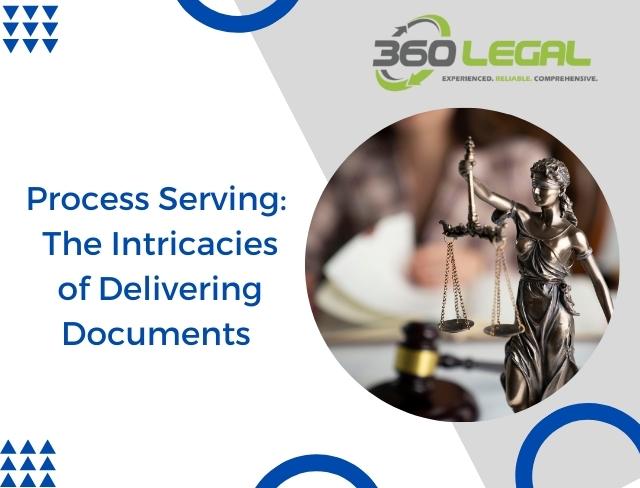Process Serving: Trick Steps to Ensure Lawful Notices Are Supplied Appropriately
Process Serving: Trick Steps to Ensure Lawful Notices Are Supplied Appropriately
Blog Article
The Function of Refine Serving in Ensuring Legal Conformity
Refine offering is a necessary part of the lawful structure that makes certain all events obtain ideal and prompt alert of lawful activities. By comprehending the ins and outs of process serving, including its methods and legal requirements, stakeholders can value just how it strengthens the judicial system.
Value of Lawful Notice
Legal notification acts as a basic column in the judicial process, guaranteeing that all parties entailed are managed the chance to respond and defend their passions. This concept is vital to preserving the integrity of lawful procedures, as it supports the right to due procedure, a keystone of democratic legal systems. When people or entities are correctly alerted of lawful actions versus them, they can appropriately prepare their protection, thus advertising justness and transparency in the judicial sector.
Additionally, legal notification facilitates notified decision-making among parties, enabling them to assess their options and possible results. Without correct notification, plaintiffs may be robbed of their rights, causing unfair judgments or default judgments. This can eventually threaten public confidence in the lawful system and its ability to supply equitable resolutions.
On top of that, the exact and timely distribution of legal notices is essential for the reliable functioning of the courts. It reduces hold-ups and guarantees that situations progress with the judicial system without unneeded hindrances. Consequently, adhering to the procedures bordering lawful notification is not only a lawful obligation but likewise an essential component in promoting a efficient and fair lawful procedure.
Refine Offering Approaches
Refine serving encompasses various techniques created to make certain that legal files are provided to the appropriate parties in a efficient and timely way. The most conventional approach is individual solution, where a procedure web server literally hands the papers to the private called in the lawsuit. This technique is commonly preferred because of its dependability, as it ensures that the recipient is directly informed.
Another usual approach is replaced solution, which enables files to be left with a person of ideal age or discernment at the recipient's home or place of company. This approach is made use of when individual service is impractical, ensuring that the person still gets notice.
Additionally, solution by mail is allowable in specific jurisdictions, where records are sent out through registered or licensed mail, typically requiring an authorized invoice to confirm distribution. Some territories also permit service via digital means, such as e-mail or fax, especially in instances entailing company entities.

Lawful Demands and Compliance

Secret lawful demands commonly consist of the requirement of serving files in a timely manner, using authorized people, and giving ample notification to the event being offered. For example, numerous jurisdictions require that process web servers be accredited or signed up, ensuring they are well-informed about local regulations and treatments. Moreover, specific documents might need additional procedures, such as registration or a particular method of shipment, to be considered legitimate.
Furthermore, the approach of service may differ depending on the nature of the instance and the location of the offender. Comprehending these nuances is critical for lawful professionals and procedure servers alike. Failing to follow these lawful requirements can cause challenges in court, possibly disregarding the situation or postponing proceedings. Thorough attention to conformity is essential in the process offering landscape.
Effects of Improper Solution
Improper service of legal papers can have substantial repercussions that extend beyond simple step-by-step missteps. When legal papers are not served properly, it can lead to delays in legal procedures, possibly preventing an event's ability to efficiently respond or protect their instance. This can lead to undesirable judgments or dismissals, eventually affecting the end result of the lawful issue.
In addition, inappropriate solution might lead to increased legal costs, as parties may require to launch added process to fix the solution concern. Courts commonly call for rigorous adherence to solution procedures, and failure to conform can weaken the integrity of the judicial process. In some circumstances, an event might lose the right to pursue their defenses or claims due to disobedience with solution demands.
Furthermore, improper service can develop complication relating to responsibilities and timelines, causing more difficulties in the instance. It may also motivate charms or movements to reevaluate, prolonging the resolution of disagreements. In recap, the consequences of inappropriate solution are far-reaching and can significantly interfere with legal process, highlighting the necessity for thorough compliance with established solution procedures.
Benefits of Expert Process-server
Involving expert procedure servers uses numerous advantages that can boost the effectiveness and performance of legal process. These experts possess specialized training and knowledge in the This Site nuances of legal files and solution laws, making sure compliance with administrative demands. This expertise decreases the threat of incorrect service, which can lead to expensive hold-ups and even situation termination.
Secondly, professional process-server often have actually developed systems and procedures to track and record service efforts, giving customers with prompt updates and comprehensive records. This openness cultivates trust and allows legal groups to strategize effectively.
Furthermore, working with a specialist procedure web server can conserve useful time for lawyers and their personnel (Process Serving). By outsourcing this critical job, lawyers can concentrate on case preparation and customer depiction, eventually improving their general productivity
Moreover, professional process-server are skilled at dealing with challenging situations, consisting of incredibly elusive accuseds, which may call for determination and tact. Their experience in handling such challenges raises the probability of successful service.
Verdict
In final thought, procedure serving is necessary for maintaining legal conformity and upholding the concepts of due procedure. Ultimately, the function of specialist process web servers is essential in reinforcing from this source public self-confidence in the honesty and performance of lawful process.
Process offering is an essential component of the lawful structure that makes sure all events address obtain prompt and proper notice of legal activities. Sticking to the procedures bordering lawful alert is not only a lawful responsibility but also a vital part in cultivating a reliable and fair legal procedure.
The most traditional approach is individual service, where a process server literally hands the documents to the individual called in the lawful action. When lawful documents are not offered appropriately, it can result in hold-ups in lawful proceedings, potentially hindering a party's capacity to successfully respond or protect their situation.In conclusion, process offering is important for keeping legal compliance and promoting the concepts of due process.
Report this page